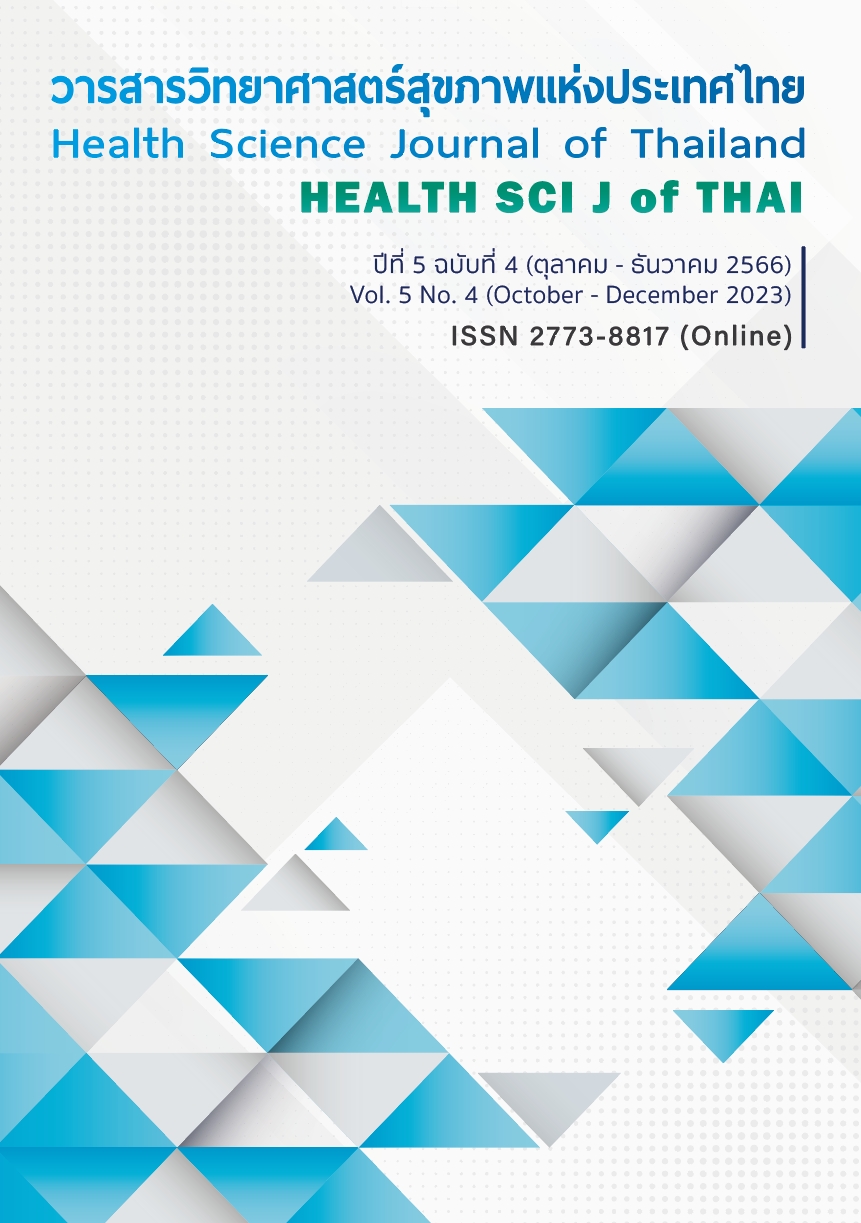Factors Predicting the Healthcare Behavior of Adolescence Pregnancy
Main Article Content
Abstract
This descriptive research aimed to examine the predictor variables of the healthcare behavior of pregnant adolescents. The
samples were 200 pregnant adolescents attending the prenatal care unit at Sawanpracharak Hospital. The research tool was a questionnaire including personal data, developmental assets, families’ strengths, attitudes toward pregnancy, health literacy, and healthcare behavior in pregnant adolescents. The Content Validity Index was 0.89, 0.80, 0.86, 0.91, and 0.90 respectively. The reliability by Cronbach’s Alpha Coefficient was 0.86, 0.84, 0.82, 0.81, and 0.80 respectively. Pearson’s correlation and Chi-square were used to test the correlation between variables. Stepwise multiple regression analysis was employed to test the predictors. The results indicated statistically significant positive relationships among economic status, developmental assets, families’ strengths, attitudes toward pregnancy, health literacy, and healthcare behavior of pregnant adolescents at p<0.01 (r=0.13, 0.61, 0.47, 0.44, and 0.54 respectively). The developmental assets, health literacy, and attitude toward pregnancy all together predict the healthcare behavior of pregnant adolescents for 54.30 percent. The predictive equation was written as The healthcare behavior of pregnant adolescents = 0.52+ 0.43 developmental assets + 0.02 health literacy + 0.12 attitudes toward pregnancy. Based on the findings, it is recommended that healthcare professionals create guidelines aimed at promoting healthy behaviors among pregnant adolescents. These guidelines should take into account the adolescents’ developmental assets, health literacy, and attitudes towards pregnancy in order to be effective. By tailoring interventions to these specific factors, healthcare professionals can better support adolescent mothers and promote positive health outcomes for both mother and child.
Article Details

This work is licensed under a Creative Commons Attribution-NonCommercial-NoDerivatives 4.0 International License.
References
Ratta S, Arunwong R, Nithakorn R. The Model Development of Prevention and Solution in Premature Pregnancy of Teenagers in Kamphaengphet Province. Rajabhat J. Sci. Humanit. Soc. Sci. 2017; 9(2): 142-60.
Wall-Wieler E, Roos LL, Nickel NC. Teenage pregnancy: the impact of maternal adolescent childbearing and older sister's teenage pregnancy on a younger sister. BMC Pregnancy childbirth. 2016; 16(1): 120-31. https://doi.org/10.1186/s12884-016-0911-2
Srisuk R, Deoisres W, Sawatphanit W. Factors Influencing Initiation of Antenatal Care within The first 12 weeks of Pregnancy among Pregnant Women visiting Antenatal Clinics in Phanat Nikhom District, Chonburi Province. CHJ. 2016; 41(2): 149-56.
Yurdakul M. Perceived social support in pregnant adolescents in Mersin area in Turkey. Pak J Med Sci. 2018; 34(1):115-20. https://doi.org/10.12669/pjms.341.14221
Duncan R, Paterson H, Anderson L, Pickering N. Proactively providing contraception to New Zealand adolescents. Aust N Z J Obstet Gynaecol. 2021; 61(3):484-86. https://doi.org/10.1111/ajo.13343
UNICEF Thailand. Situation Analysis of Adolescent Pregnancy in Thailand. Bangkok: Unicef; 2015.
Puspita T, Jerayingmongkol P, Sanguanprasit B. Factors Related to Self-Care Behavior among Pregnant Women in Garut District, Indonesia. J Health Res. 2017; 29 (Suppl. 1): S1-6.
Mohamed NA, Mahmoud GA. Self-concept and self-esteem among adolescent pregnant women at General Assuit Hospital, Assiut City. Egypt Nurs J. 2018; 15(2): 93-101.
Pender NJ. Health promotion in nursing practice (Sixth edition). New Jersey: Pearson; 2011.
Bahabadi FJ, Estebsari F, Rohani C, Kandi ZRK, Sefidkar R, Mostafaei D. Predictors of Health-Promoting Lifestyle in Pregnant Women Based on Pender's Health Promotion Model. Int J Womens Health. 2020; 24 (12): 71-77. https://doi.org/10.2147/IJWH.S235169
Chomphunit P, Saengploy T, Fhunpayom S. Pender's Health Promotion Model and Application for The Pandemic of Coronavirus 2019 Preventing in the Elders. Journal of Nursing and Health Sciences. 2020; 14(3): 22-9.
Khodaveisi M, Omidi A, Farokhi S, Soltanian AR. The Effect of Pender's Health Promotion Model in Improving the Nutritional Behavior of Overweight and Obese Women. Int J Community Based Nurs Midwifery. 2017; 5(2):165-74. https://doi.org/10.1136/bmjopen-2016-015415.131
Apinuntavech S. Life Assets in Teenage Pregnancy. Siriraj Med J. 2017; 69 (3):114-21.
Lertsakornsiri M. The Relationship between Personal Factors as well as Families' Strengths and Developmental Assets in Pregnant Adolescents. NUJST. 2014; 22 (3): 47-57.
Lertsakornsiri M. Factors Associated with Healthcare behavior in Pregnant Adolescents. JNSH. 2014; 37(4):74-82.
Nutbeam D. Health literacy as a public health goal: a challenge for contemporary health education and communication strategies into the 21st century. Health Promotion International. 2000; 15(3): 259-67. https://doi.org/10.1093/heapro/15.3.259
Pramoolsinsup K, Khungtumneam K, Kompaya J, Kovavisarac E. The Effect of Health Promotion Program on Health Promoting Behavior Primigravida Adolescents. J Nurs Healthc. 2014; 31(4): 54-60.
Cohen J. Statistical power analysis for the behavior sciences (Second edition). NJ: Lawrence Eelbaum; 1988.
Thuong NTL, Deoisres W, Chuahorm U. Factors predicting timely initiation of antenatal care among pregnant women in Binh Dinh Province, Vietnam. Journal of Nursing Science & Health. 2015; 38(4): 123- 36.
Junjongkon N, Kongbamrung D, Khoka A. Health Promoting Behaviors of Pregnant Women Attending the Antenatal Clinic at Banmanik and Si Sunthon Subdistrict Health Promotion Hospitals in Thalang District, Phuket Province between June and July 2020. Bull Dept Med Sci. 2021; 63(2): 287-300.
Na-sangiem D, Kuasit U. The Factors Predicting Self-Care Behaviors among Adolescent Pregnant Women in Provinces in the 7th Health Region. Nursing Journal CMU. 2022; 49(4): 261-73.
Ibrahima LHK, El Borgyb MD, Mohammed HD. Knowledge, attitude, and practices of pregnant women towards antenatal care in primary healthcare centers in Benghazi, Libya. J Egypt Public Health Assoc. 2014; 89:119-26. https://doi.org/10.1097/01.EPX.0000455673.91730.50
Eadie C. Health Literacy: A Conceptual Review. MedSurg Nursing. 2014; 23(1): 9-13.
Lupattelli A, Picinardi M, Einarson A, Nordeng H. Health Literacy and its association with perception of teratogenic risks and health behavior during pregnancy. Patient Educ Couns. 2014; 96(2): 171-8. https://doi.org/10.1016/j.pec.2014.04.014
Bootsri W, Sirisophon A. Predicting Factors of Promoting Behaviors among Pregnant Women Receiving Antenatal Care Services at Community Hospital, Nakhonsawan Province. JAHS SSRU. 2020; 5(1): 60-70.


